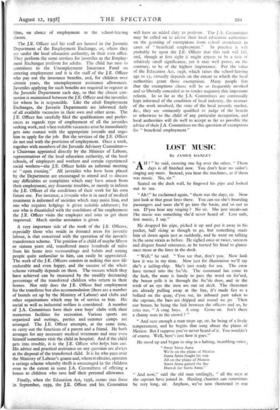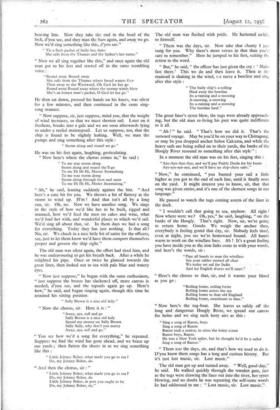LOST MUSIC
By JAMES HANLEY
"AH ! " he said, crossing one leg over the other, " Them days is all finished now. You don't hear no sailor's singing any more. Instead, you hear the machines, as if them was music. No, sir."
Seated on the dock wall, he fingered his pipe and looked out to sea.
" Ah ! " he exclaimed again, " them was the days, sir. Now just look at that great liner there. You can see she's boarding passengers and soon she'll go into the basin, and so out to sea. D'you hear any singing ? No sir. She just sneaks out Eke music was something she'd never heard of. Lost sails, lost music, I say."
He dropped his pipe, picked it up and put it away in his pocket, half rising as though to go, but something made him sit down again just as suddenly, and he went on talking in the same strain as before. He sighed once or twice, sarcasm and disgust found utterance, as he turned his head to glance once more at the liner in the dock.
" Well," he said. " You see that, don't you. Now look how it was in my time. Now just for illustration we'll say she's a sailing-ship. She's just ready for sea. The crew have turned into the foc'sle. The command has come to the lock, the mate is handy to pass the word on for'ard, the bosun yells it in through the foc'sle door, and in the wink of an eye the men are out on deck. The shoremen are already pulling away at the line, it's made fast to a bollard on the quay, d'you see, its inboard part taken to the capstan, the bars are shipped and round we go. Then our bosun, he being the link between the officers and us, he cries out, " A song boys. A song. Come on. Isn't there a chanty man in the crowd ? "
" And sure enough a man steps up, sir, he being of a lively temperament, and he begins that song about the plains of Mexico. But I suppose you've never heard of it. You wouldn't of course. Well, here's just how it goes."
He stood up and began to sing in a halting, trembling voice
"Away Santa Anna We're on the plains of Mexico Santa Anna fought his way All on the plains of Mexico Santa Anna gained the day Hurrah for Santa Anna."
" And now," said the old man smilingly, " all the men at the capstan have joined in Hauling chanties can sometimes be very long, sir. Anyhow, we've now shortened in our heaving line. Now they take the end to the head of the lock, d'you see, and they man the bars again, and awa.5?.ve go. Now we'd sing something like this, d'you see."
" Tis a flash packet of bully boy fame She sails from the Thames and the Spiker's her name.,"
" Now we all sing together like this," and once again the old man got to his feet and started off in the same trembling voice :
"Bound away Bound away She sails from the Thames where broad waters flow Then away to the Westward, Oh God let her go Bound away Bound away where the stormy winds blow She's an honest man's packet, 0 God let her go."
He then sat down, pressed his hands on his knees, was silent for a few minutes, and then continued in the same sing- song manner.
" Now suppose, sir, just suppose, mind you, that the weight of wind increases, so that we must shorten sail. Later on it freshens, breaks into a gale and we are soon afterwards lying to under a reefed maintopsail. Let us suppose, too, that the ship is found to be slightly leaking. Well, we man the pumps and sing something after this style :
" Storm along and round we go."
He was on his feet again, laughing, gesticulating.
" Now here's where the chorus comes in," he said
To me way storm along Storm along and round she'll go To me Hi Hi Hi, Master Stormalong To me way storm along Storm along through frost and snow To me Hi Hi Hi, Mister Stormalong."
" Ah," he said, leaning suddenly against the bitt. " And here's a cute bit for you. We throws a bit of flattery at the storm to wind up. H'm ! And that isn't all by a long run, sir. Oh, no. Now we have another song. We sings in the style of how we'd like her to be built, rigged and manned, how we'd feed the men on cakes and wine, what we'd load her with, and wonderful places to which we'd sail. We'd sing all about that, sir. In them days we had a song for everything. Today they has just nothing. Is that all? No, sir. We chuck in a nice little bit of satire for the officers, see, just to let them know we'd have them comport themselves proper and govern the ship right."
The old man was silent again, the effort had tired him, and he was endeavouring to get his breath back. After a while he relighted his pipe. Once or twice he glanced towards the great liner, then looked out to sea with pale blue and watery eyes.
" Now just suppose," he began with the same enthusiasm, " just suppose the breeze has slackened off, more canvas is needed, d'you see, and the topsails again go up. Here's how," he said, and began singing again, though this time he retained his sitting position.
" Sally Brown is a nice old lady."
" Now the chorus, sir. Here it is : "
"Away, aye, roll and go Sally Brown is a nice old lady Spend my money on Sally Brown Sally Sally, why don't you marry Away, aye, roll and go."
" You see how we'd a song for everything," he repeated. Suppose we find the wind has gone ahead, and we brace up our yards ; then flatten the sheets in as we sing something like this :
" Little Johnny Boker, what made you go to sea ? Do, my Johnny Boker, do.
" And then the chorus, sir : "
" Little Johnny Boker, what made you go to sea ?
Do, my Johnny Boker, do Little Johnny Boker, in port you ought to be Do, my Johnny Boker, do."
C C
The old man was` finshed with pride. He Munn:tea awhile to ;himself.
" Them was the days, sir. Now take that chanty I just sung for -you. Why there's more verses in that than you'd care to remember." Here he jumped to his feet, suiting the action to the word.
" But," he said, " the officer has just given the cry : ' Make fast there.' This we do and then leave it. Then as the mainsail is shaking.in the wind, N:e reeve a bowline. and sing after this style :
" The bully ship's a-rolling Haul away the bowline Its a-raining and a-snowing A-snowing, a-snowing Its a-raining and a-snowing The bowline haul."
The great liner's syren blew, the tugs were already approach- ing, but the old man re-living his past was quite indifferent to it all.
" Ah ! " he said. " That's how we did it. That's the outward voyage. May be you'd be on your way to Chittagong, or may be you dropped anchor below Calcutta, and while the heavy sails are being rolled on to their yards, the banks of the Hoogly River resound to something after this style " : In a moment the old man was on his feet, singing this :
"Aye-Aye-Aye-Aye, and we'll pay Paddy Doyle for his boots Aye-aye-aye-aye, and we'll have no slop-chest suits."
" Now," he continued, " you bunted your sail a little higher as you got to the end of each line, until it finally rests on the yard. It might interest you to know, sir, that that song was given entire, and it's one of the shortest songs in our language."
He paused to watch the tugs coming astern of the liner in the dock..
" I wouldn't call that going to sea, anyhow. All right ! Now where were we? Oh, yes," he said, laughing, " on the banks of the Hoogly. That's right. Now, sir, we're going to return home. Goodo. We weigh the anchor then, everybody is feeling grand that day, sir. Nobody feels tired, even at night, you see we're homeward bound. All hands warm to work on the windlass bars. Ah ! It's a great feeling you have inside you as the iron links come in with your words, and here's the words, sir :
"Pipe all hands to man the windlass See your cables stowed all clear We today set sail for India And for English shores we'll steer!?
" Here's the chorus to that, sir, and it warms your blood as you go :
"Rolling home, rolling home Rolling home across the sea Rolling home to dear old England Rolling home, sweetheart to thee."
" Now here's the tug-boat. She leaves us safely off the long and dangerous Hoogly River, we spread our canvas for hoine and we sing such lusty airs as this :
" Sing a song of Ranzo, boys Sing a song of Ranzo Ranzo took a notion, to cross the briny ocean Ranzo boys, Ranzo.
He was a New York tailor, but he thought he'd be a sailor Sing a song of Ranzo."
" Them was the days, sir, and that's how we used to do it. D'you know them songs has a long and curious history. But it's just lost music, sir. Lost music."
The old man got up and turned away. " Well, good-day," he said. He.walked: quickly through the wooden gate, just as the tugs were drawing the liner out into the river, her syren blowing, and no doubt he was repeating the self-same words be had addressed to me : " Lost music, sir. Lost music.',',







































 Previous page
Previous page